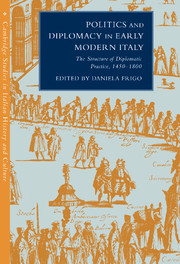Book contents
- Frontmatter
- Contents
- Introduction
- Diplomacy and government in the Italian city-states of the fifteenth century (Florence and Venice)
- Aspects of Medicean diplomacy in the sixteenth century
- An outline of Vatican diplomacy in the early modern age
- Economic and social aspects of the crisis of Venetian diplomacy in the seventeenth and eighteenth centuries
- ‘Small states’ and diplomacy: Mantua and Modena
- Neapolitan diplomacy in the eighteenth century: policy and the diplomatic apparatus
- Savoyard diplomacy in the eighteenth century (1684-1798)
- Index of names
- CAMBRIDGE STUDIES IN ITALIAN HISTORY AND CULTURE
Economic and social aspects of the crisis of Venetian diplomacy in the seventeenth and eighteenth centuries
Published online by Cambridge University Press: 29 October 2009
- Frontmatter
- Contents
- Introduction
- Diplomacy and government in the Italian city-states of the fifteenth century (Florence and Venice)
- Aspects of Medicean diplomacy in the sixteenth century
- An outline of Vatican diplomacy in the early modern age
- Economic and social aspects of the crisis of Venetian diplomacy in the seventeenth and eighteenth centuries
- ‘Small states’ and diplomacy: Mantua and Modena
- Neapolitan diplomacy in the eighteenth century: policy and the diplomatic apparatus
- Savoyard diplomacy in the eighteenth century (1684-1798)
- Index of names
- CAMBRIDGE STUDIES IN ITALIAN HISTORY AND CULTURE
Summary
Although the last work specifically devoted to the history of Venetian diplomacy in the seventeenth and eighteenth centuries dates back more than half a century, the topic is one that has never ceased to interest scholars of the Republic of San Marco. Indeed, various passages in recent works reveal renewed interest in a subject once reserved for specialists in diplomacy or in the history of international relations and today more closely studied by students of the social history of the institutions.
As Willy Andreas framed the question in the late 1930s, the evolution of Venetian diplomacy in its last two centuries of life was ‘mechanically’ correlated with the political decline of the Republic in Europe. This was a thesis that, although incontrovertible, risked simplifying every change in the diplomatic apparatus by compressing its significance. Some years prior to Andreas, in one of the few comparative studies of the diplomacy of the Italian states of the modern age, Carlo Morandi had advanced a imilar argument by including Venice among the states either engaged in strenuous defence of their status or entering irremediable decline. And it was a perspective adopted shortly afterwards by Ruggero Moscati: although in the context of the progressive loss of vitality by the diplomacy of San Marco, Moscati did not report the presence of any exterior symptom of decay but instead discerned ‘numerous flashes’ which lit up its twilight years.
- Type
- Chapter
- Information
- Politics and Diplomacy in Early Modern ItalyThe Structure of Diplomatic Practice, 1450–1800, pp. 109 - 146Publisher: Cambridge University PressPrint publication year: 2000



